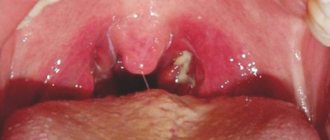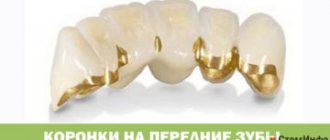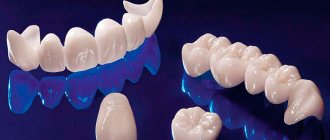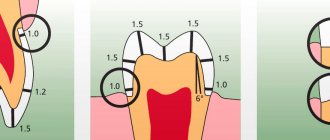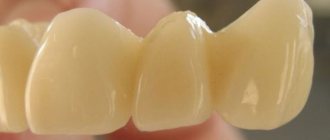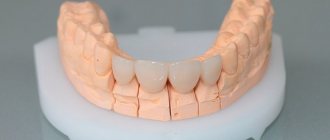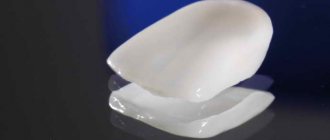29.04.2018
5236
Sign up for a free consultation:
- 1 Causes of allergies to metal prostheses
- 2 Problems with plastic implants
- 3 How to determine an allergy to a denture
- 4 How to get rid of allergies
Recently, in dental orthopedics, doctors are increasingly diagnosing such a complication as an allergy to dentures. It occurs in absolutely healthy people who have not previously encountered an irritating reaction to proteins, dust or food. It can occur on metal alloys and salts, plastic and rubber compounds. Sometimes the problem appears several months or even years after prosthetics.
How to understand that there are symptoms of an allergy to a dental crown or dentures?
An allergy is an overactive reaction of the body to close contact with any substance (allergen). Many people are allergic to dentures, and the symptoms are pronounced. Most often a person develops:
- pain while eating;
- burning sensation in the oral cavity (tongue area and mucous membranes);
- increased salivation;
- swelling of the larynx, gums and nose;
- skin rash;
- the appearance of a bitter or sour taste;
- slight increase in body temperature (up to 37.5°C);
- sore throat with cough;
- severe gum bleeding.
An allergic reaction, as a rule, does not occur on the day of fixation of dental crowns or dentures. It appears several months and sometimes years after installation. Some people experience allergies when replacing old crowns with new ones.
Allergy to dental crowns is manifested by itching, fever, swelling of the mucous membranes of the mouth
Provoking factors
There are often situations when diagnostic measures do not confirm the described materials as allergens. And here it is important to take into account that in addition to the above reasons, factors provoking an allergy to crowns can be:
- Impaired heat exchange between the crown and gum tissue.
This happens if it was made poorly (the prosthesis and gums do not fit tightly to each other) or the installation of the crown was subsequently disturbed. The result is loosening of the mucous membrane, reducing the strength of the walls of blood vessels and penetration of the allergen into the blood. - Injuries , even the smallest ones, during the use of a crown or prosthesis can damage the mucous membrane. They are the “entry gate” for inflammatory and allergic reactions.
- Corrosion is the destruction of the surface layer of a product (for example, metal ceramics) when in the oral cavity (especially under the influence of saliva). To one degree or another, this process occurs constantly, aggravated by the influence of various factors.
- Change in saliva acidity .
It can occur due to gastrointestinal diseases, changes in diet or climate, and for other reasons. Saliva with increased acidity reacts more actively with the construction material. This accelerates the destruction of its surface layer. Allergic components (if any) are released and enter the body without hindrance. - Exceeding the service life .
Such a violation is unsafe for any product, especially dental products. After the guaranteed period, the destruction of the crown begins to occur naturally. It does not matter how carefully the patient looked after her. Therefore, it is recommended not to exceed the specified period and, if possible, use materials with long warranty parameters.
It is impossible to foresee and eliminate all possibilities of allergies. But knowledge of the listed nuances will help prevent or alleviate it.
Allergy to metal-ceramic crowns
Metal ceramics are in great demand in dentistry. Crowns based on it are characterized by high strength, aesthetics and long service life. With their help, it is possible to restore chewing molars and teeth included in the smile zone.
These crowns contain ceramic and metal. Their only drawback is the likelihood of developing an allergic reaction (due to the metal in the composition). Let's take a closer look at what metals provoke allergies and what factors increase their occurrence.
Causes of allergies to dentures: materials that cause a reaction
Most often, a person is allergic to metal-ceramic crowns and metal crowns with spraying. The likelihood of developing an allergic reaction is associated with the metal that is part of the crown. Most often it is observed on cobalt, less often on chromium and nickel.
As practice shows, gold does not provoke allergies. However, due to its high cost and low aesthetics, it is rarely used for prosthetics in modern dentistry.
Most often, allergies develop to cobalt.
Among the main reasons for the development of allergic reactions are:
- low immunity;
- mucosal injuries;
- change in heat exchange between the structure and the gum (the monomer penetrates the blood more easily);
- increased sensitivity to a certain metal;
- age of the patient (allergic reactions are diagnosed extremely rarely in children);
- allergen activity.
Provoking factors
There are a number of provoking factors. If the structure does not fit tightly to the gum, a friction effect may occur during chewing. It is accompanied by a local increase in temperature. Soft tissues become loose, blood vessels dilate. This leads to increased absorption of substances. In such a situation, it is important to immediately change the design.
Each prosthesis has its own service life. After its expiration, the material from which it is made begins to gradually deteriorate. Even with careful care of the structure, it needs to be changed in a timely manner. Using the prosthesis after the expiration date may lead to an allergic reaction.
In the presence of a number of pathologies or a sharp change in climate, the acid composition of saliva changes in a person (acidity increases significantly), as a result of which the oxidation process can begin (galvanic syndrome).
If a person’s saliva composition changes due to certain diseases, this can trigger the development of an allergy to crowns
There is often a reaction to painted structures (to enhance aesthetics). If an allergic reaction appeared immediately on the day the crowns were installed, there is a high probability that the material from which they are made was not the cause. The illness could be triggered by drugs used by the orthopedic surgeon during prosthetics (for example, an anesthetic).
Allergy symptoms
A common problem that dental visitors encounter is an allergy to dentures.
The symptoms that appear in this case are as follows:
- body temperature rises;
- the presence of a metallic taste in the mouth;
- lack of sensitivity;
- the appearance of a rash on the skin;
- symptoms resembling bronchial asthma;
- swelling on the tongue, lips, gums.
There is pain in the mouth and increased salivation. In especially severe cases, Quincke's edema can occur, which in turn poses a danger to human life.
Which components are allergens?
Allergies usually appear due to the fact that prostheses contain certain components. The body primarily reacts to metal components. The thing is that in order to reduce the cost of devices and make them more accessible, other chemical elements can be added: cobalt, nicol, chromium, copper, etc.
The listed elements begin to react with the body, as a result of which the symptoms described above begin to appear. Metal with such impurities is often added to clasp dentures, dental bridges or inexpensive crowns.
Chromium is a substance to which you may be allergic
Interesting! Precious metals, such as gold, are not capable of causing allergies. However, due to the high cost, many patients simply cannot afford them. This is why most people decide to install inexpensive dentures containing allergic components.
Material such as titanium does not cause allergies, this has been proven more than once. It is especially good because the body gives almost no reaction to it. Ceramics, as well as products made from it, have similar properties.
Allergies can occur because different metals are incompatible. Due to the fact that there are different metals in the mouth, a so-called galvanic current begins to appear, the body is poisoned, salivation increases, and insomnia worries. In medicine, this phenomenon is called galvanic syndrome.
Requirements for prostheses
Dentures must be durable
In order to avoid intolerance to metal dentures, they must meet certain requirements, namely, hypoallergenic.
Among them:
- orthodontic dentures must be durable;
- the design must meet aesthetic requirements;
- prostheses must be chemically resistant to the environment;
- there should be no reaction upon contact with saliva or food.
If removable dentures do not meet such simple requirements, they will begin to increase oxidative processes several times. This is where allergies begin to develop.
Complete removable denture
In the orthodontic field, specialists use materials that increase the body's sensitivity several times. This applies not only to the prostheses themselves, but also to cement, paste, etc. Elements are able to penetrate the body through mucous membranes, skin, lungs, and so on.
What elements cause allergies?
In order to understand how allergies occur, you need to know how the body reacts to certain elements that make up prostheses. The very first element, nickel, is part of stainless steel.
Due to the chemical composition of saliva, the carious process begins in the oral cavity. If the doctor or the patient himself has identified an allergy, in the future you should refuse to use any items that contain nickel.
Cobalt chrome right ones contain chromium. The element affects many body systems and causes the development of allergies. Iron is resistant to corrosion, and there is never any allergy under its influence.
Zirconium products
In order to achieve aesthetics, various dyes are used; allergies to them often occur. In this case, the problem has a simpler solution - prostheses that have not been pre-painted are used.
In the oral cavity, allergies develop because electrochemical processes occur. In simple terms, the process is called corrosion. It depends on what structure the alloys have.
Important! Chemical elements can cause not only allergies, but also toxic reactions.
Allergy to acrylic
Not only metals can trigger allergies. Plastic products can lead to inflammatory processes in the mouth. Acrylic plastic can cause stomatitis.
Allergies are triggered by residual monomer; in plastic its content should not be higher than 0.2%. If the polymerization process of the metal was disrupted, the concentration will be increased to 8%.
Acrylic dentures
Below you can see several third-party factors that often cause allergies:
- Heat exchange . Most often it is violated in acrylic removable structures. Because of this, the mucous membrane loosens, the vessels become more permeable, and the monomer penetrates into the blood.
- Erasing process . Over time, dental processes wear off and the content of elements in saliva increases. As a result, all this leads to allergies.
- The acidity of saliva changes.
- Mechanical injuries. During chewing, careless movements can lead to injury to the mucous membrane. The result is redness and allergies.
Today, nylon prostheses have begun to be produced; soft plastics are used for their manufacture. They are safe from all points of view; there is no danger to human health.
What are the diagnostic methods?
If you notice the above symptoms, you should immediately make an appointment with an orthopedic doctor. Additionally, you may need to be examined by other specialists (depending on the symptoms) - an allergist, dermatologist, immunologist and endocrinologist. If an allergic reaction to a prosthesis is suspected, the doctor should evaluate:
- composition and viscosity of saliva;
- visible defects;
- change in shade and stage of wear of the structure.
For diagnosis, the doctor collects a dental and allergy history. An allergy history includes establishing a person’s hereditary predisposition to allergies. It is important to clarify whether he suffers from eczema, allergic rhinitis, bronchial asthma and other pathologies.
To confirm the diagnosis, laboratory tests are prescribed: intradermal, provocative, application. For example, to detect contact allergies to nickel or chromium, alcohol solutions of metal salts are used.
If you suspect an allergy, be sure to study the composition of your saliva.
Often they resort to elimination and exposure tests, when the prosthesis is temporarily removed and the reaction is observed. Based on the diagnostic results and symptoms, the doctor prescribes the most appropriate therapy.
Signs of pathology development
An allergic reaction can occur at any time after the crown is installed - a week later, or years later. The initial compatibility of the body with the prosthesis material is of great importance. The general health of the patient at the time of the onset of allergies is also important.
Regardless of the time of onset of the pathology, you should pay attention to the following symptoms:
- swelling of the mucous membrane;
- redness and inflammation of soft tissues in the oral cavity;
- sore gums and tongue;
- sore throat and cough without mucus discharge;
- change in the amount of saliva produced (decreased or noticeable increase);
- the composition of saliva is thicker and more viscous than usual;
- change in taste (the appearance of a feeling of bitterness, acidity, metallic taste);
- susceptibility to injury to the mucous membranes of the mouth and tongue, mainly during chewing;
- rashes in the form of ulcers in the mouth (sometimes they can appear on other parts of the face or body);
- high fever, inflamed parotid salivary glands (this can lead to mumps) are manifestations of a severe form of allergy.
Important! In rare cases, such an allergic reaction can lead to angioedema. In this case, a fatal outcome cannot be ruled out.
Intoxication that occurs over a long period of time is especially dangerous. This inevitably leads to disruption of other body systems, especially the gastrointestinal tract. Chronic diseases in this situation are also subject to exacerbations.
The importance of responding to any negative changes in well-being after the installation of a crown or prosthetic structure is obvious. Timely measures will prevent the emergence of other (sometimes more serious) problems.
First aid and treatment methods
The main task when an allergic reaction occurs is to eliminate its source as quickly as possible. With a removable structure, this is easy to do; just remove it. In the case of dental crowns, you should make an appointment with a prosthodontist. Until this point, it is recommended to rinse your mouth with antiseptic solutions.
Experts advise immediately taking an antihistamine (for example, Claritin or Tavegil) if you have allergy symptoms. With the help of the drugs “Enterosgel” or “Smecta” it will be possible to quickly remove the allergen from the body. If soft tissues are damaged, healing gels (for example, Cholisal) can be applied.
If you experience severe pain, you are allowed to take a non-steroidal anti-inflammatory drug (for example, Nise). In advanced situations, if the pills do not help, you should call emergency help. If an allergic reaction occurs, it is important to replace it with structures made from hypoallergenic materials. This is the only way to cope with the disease.
To exclude the possibility of developing allergies, it is recommended to use metal-free dentures
Treatment tactics and prevention
Once the source of the allergy is determined, the specialist’s task is to choose the most optimal treatment method. Depending on the situation, one of the options or a combination of them is used:
- Removing a crown or bridge and replacing them with other structures suitable for each case. Their choice is made based on the obtained diagnostic data. This is the most radical, but also the most reliable way to get rid of allergies.
- Shielding . A less complex option for protecting against possible allergic manifestations. Here, a film of silver is applied to the installed product using a special chemical process.
- Electroplating. The method is similar to the previous one, only the crown is covered with a thin layer of gold.
- Drug treatment .
Effective only in cases of mild forms of allergies (stomatitis, eczema). In this case, symptomatic and antihistamines are prescribed, in the form of tablets or injections, adsorbents in the form of powders, tablets or other preparations, and ointments for the oral cavity. - Special blood purification (plasmopheresis, immunosorption). Such procedures are required for more complex allergic reactions. With their help, the blood plasma is cleared of present allergens over a short period of time.
To prevent the occurrence of allergies when installing crowns or bridges, it is very effective to prevent such pathology.
Preventive measures include:
- test to determine the compatibility of the body with the dental materials used;
- blood test for antibody content;
- adherence to the schedule for wearing removable dentures recommended by the doctor;
- daily oral hygiene; in addition, it is necessary to clean the oral cavity and removable structure after each meal;
- careful attention to the condition of the prosthesis and mucous tissues - for this you should avoid eating hard and viscous foods;
- eliminate or reduce smoking.
Attention! The ideal way to prevent allergies would be to undergo an examination before installing a crown, and not during treatment.
It is now clear that crown allergies cannot be cured, but they can be prevented. If you pay close attention to the condition of your teeth and the body as a whole.
In the video, a specialist will talk in more detail about the problem described in this article.
What are hypoallergenic crowns?
Products made from metal-free ceramics are recognized as hypoallergenic crowns. Due to the absence of a metal base, a person does not develop individual intolerance. The design is characterized by high aesthetics and reliability, but its disadvantages include high cost.
It can be made of porcelain, aluminum dioxide or zirconium dioxide. In all cases, the possibility of an allergic reaction is excluded.

